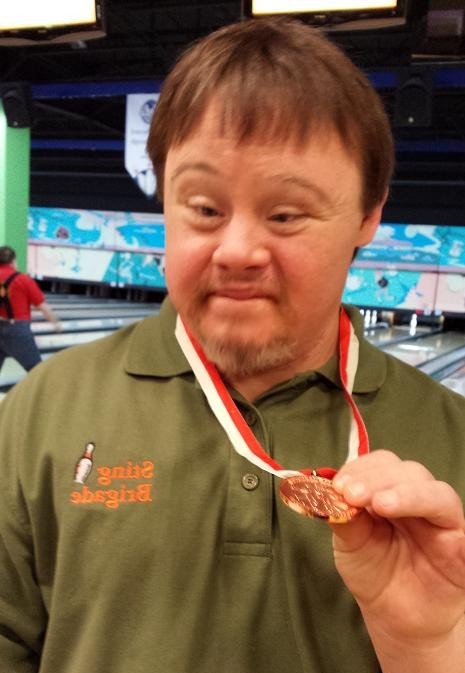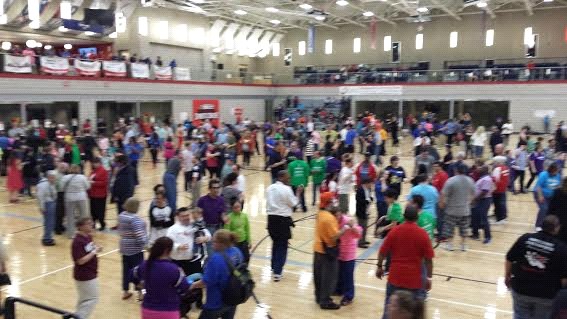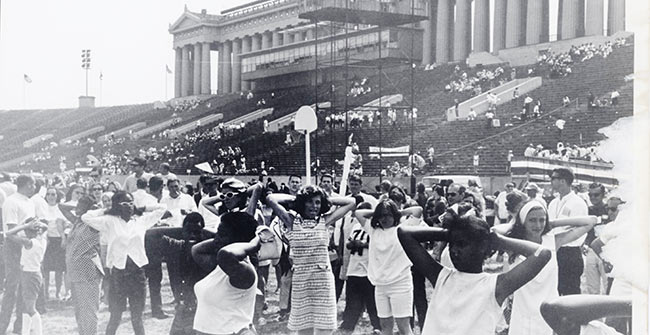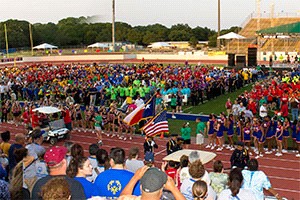The athletes came with an abundance of the original spirit of the Special Olympics movement: inclusion, courage, and fair play.

Cyrus Moore, bronze medal bowler and Austin live music aficionado. Photo by Beverly Baker Moore / The Rag Blog.
AUSTIN — Last month, as they do every year, a few thousand Special Olympics athletes came to Austin for State Winter Games. For those unfamiliar, the “special” in Special Olympics refers to the one stipulation for participation: an official diagnosis of intellectual disability (obtained most often in early childhood through standardized literacy tests) and, oh yes, over the age of 10.
We found Special Olympics as hundreds of thousands of other parents and family members have, through the local games organized by teachers in our son’s elementary school. When we relocated to a community that had no Special Olympics program, we began one. That was 25 or so years ago and these days Cyrus is a year-round athlete and we are all still members of the large extended family that is Special Olympics.
All of the athletes who competed in Austin had been preparing for months. They are serious representatives — of themselves, their teams, and their communities — at these State Games. The athletes came with an abundance of the original spirit of the Special Olympics movement: inclusion, courage, and fair play. They paraded at the opening ceremonies then spent two days bowling, skating, lifting weights, or playing tennis or volleyball for medals and ribbons in venues in Austin and Round Rock. Then they threw themselves a party.
The Games are the seasonal culmination of some hard work and
old-fashioned determination.
The Games are the seasonal culmination of some hard work and old-fashioned determination. Athletes on teams practice their sport at home at least twice a week for several months, and individual athletes, like bowlers, participate in local hometown leagues year-round. The practiced teams scrimmage against locals and compete at their Area Games. Then they are eligible to travel to the State Games.
Lots of our athletes are year-round Special Olympians. Those who also play on a basketball team or go out for track and field events are already practicing for the Summer Games at UT Arlington Memorial Day weekend, as are the cyclists, kayakers, soccer and tennis players, horseback riders, and gymnasts. Summer Games have always been the largest event of the year but many athletes also go to the Fall Games in College Station in October for aquatics, bocce, softball, flag football, golf, or sailing.
Special Olympics enjoys quite a bit of community support, but we’ve all heard some jock sneer at the “everybody is a winner” premise, and complain the sports can’t be any good. Well, yes they can; at the highest levels for sure. Inclusion is the guiding principle so, of course, everybody gets a medal or ribbon, but in competition they are matched according to performance records.
Those of us who have been lucky enough to watch years of “wow” performances from our most skilled athletes have uttered many versions of “wish those other coaches would see this” as we got swept up in the intensity of the high level teams in play or the many individual bests on the track, in the pool or court, in the pits or on the lanes.
Some of those armchair athletes who stood next to us over the years are now on the courts, lanes, and fields themselves as Unified Partners. Unified Sports is a fairly new Special Olympics program where one half of the athletes on any team or in any pair will be folks with intellectual disabilities and one half without. These days a growing number of amateur community athletes are actually sweating side by side with Special Olympians on basketball and volleyball teams or trying to out-stroke them in the pool or out-strike them on the lanes, as Unified partner volunteer players. Unified team sports are some seriously good watching.
The soul of Special Olympics will always be
the ‘all heart’ crowd.
This momentary focus on our highest performing athletes notwithstanding, the soul of Special Olympics will always be the “all heart” crowd… those folks blessed not so much by good physical coordination as they are by the joy of being and of the love of doing.

2015 Winter Games dance, Round Rock Sports Center, Round Rock, Texas. Photo by Beverly Baker Moore / The Rag Blog.
So this February, more than 2,500 athletes competed in Austin. And with each athlete came at least a coach and a chaperone or a unified partner, and more often also one or more family members. Factor in all the volunteers in the various capacities required to put on the games in a half dozen venues over the long weekend and it adds up to a lot of people and activities and money going largely unnoticed by much of anyone else in the surrounding Austin community, even though all the teams travel in vans and buses, stay in local hotels, eat at local restaurants, and purchase lots of Special Olympics merchandise.
Our athletes face incredible daily challenges, so their friends and supporters try to keep the spotlight on them at the Games: It’s their time. This year was no different. They proudly paraded with their teams and banners at Opening Ceremonies and then sat through the speeches with decorum and respect. They sang all the words to the national anthem, then whooped, hollered, and headed for their hotels.
Friday and Saturday were long days and athletes were all up and at it early and didn’t quit until late. Then they wound it all up with a big dance at the Round Rock Sports Center Saturday night before going home tired and happy on Sunday.
A little history
That is Eunice Kennedy Shriver on the field in the middle of the athletes at the first Special Olympics International Summer Games in 1968. Shriver was the founder of Special Olympics, but she also loved being a coach. A few minutes after that picture was taken, she put on her bathing suit and joined athletes and coaches at the aquatics events.
The Kennedy family had a member with extreme intellectual disabilities.
Of course, the Kennedy family had a member with extreme intellectual disabilities, a situation most assume to be the impetus for that earliest incarnation of Special Olympics, a summer day camp for children and adults with intellectual disabilities she set up in her own backyard in 1963.
Just five years later, the not-for-profit charitable organization was officially established, and the first International Special Olympics Summer Games were scheduled in Chicago. A thousand athletes from 26 states and Canada gathered for those first games. They competed in field athletics, floor hockey, and aquatics, with Eunice front and center — right in the middle of the love.
The first Special Olympics activities in Texas happened in 1969 when staff from the recreation division of the Texas Association for Retarded Citizens (TARC) invited 350 athletes to compete in 10 track and field events in Waco. By 1974, 1,400 athletes competed at the new home of the Summer Games, the University of Texas at Austin. During the 15 consecutive years that the Summer Games were held at UT, the program grew until more than 4,000 athletes competed there in 1982.
Winter Games were added to the Texas Special Olympics calendar in 1989 and Fall Games in 2001. Also, every year some Texas athletes and teams go on to the Special Olympics National Games and every four years to the World Games.
Most of us wouldn’t need that Yale University study (1995) that showed that the personal and social benefits of participation in Special Olympics are extremely real; it is intuitive now. But, for too many years, people deemed mentally “deficient” were routinely dismissed as “uneducable” and unceremoniously institutionalized. The turnaround on this thinking came with the general human rights movements of the ’60s and ’70s, beginning with the first parents who resisted by “willfully” ignoring their doctors’ advice not to bond with their babies (in order to make the perfunctory institutionalization of them less painful… for the parents).
Out of these first mom-and-pop stands against forced institutionalization the inclusion movement was born.
Out of these first mom-and-pop stands against forced institutionalization the inclusion movement was born. Education and community support needs were their focus. Children with disabilities were not allowed in the public schools at all. Their parents and friends formed local nonprofits and began organized efforts to demand access to education for their children. Full access to education for our folks finally came in 1973 with the first passage of the Individuals with Disabilities Act (IDEA) and access to the larger community followed in 1990 with the passage of the Americans with Disabilities Act.
While these legislative efforts proceeded, people at home worked with local nonprofits to clear out the institutions — person by person — of all the “educable” people and educating them! Housing, work, recreation, and health programs were created to provide the support networks so the newly released folks could successfully live, learn, and work in their communities.
We continue to develop the growing network of supported working and living situations for our folks that helps them increase their independence and have more control over their own lives. No longer do other children grow up without laying eyes on a person with a disability in a classroom or out on the street as many of us did when we were kids. Years of work by lots of dedicated people have made a big difference, but prejudice lives on and work on increasing community access and acceptance continues.
As our folks benefit from increased community inclusion they are advocating more and more for themselves. For instance, in 2004, Special Olympics Self-Advocates, tired of the rampant negative use of the word “retard” as an all-purpose put-down in the media and their schools and communities, presented a request for a term change. They felt that the growing social unacceptability of the term “mental retardation” was just making things worse for them. It was in response to the athletes’ concerns that Special Olympics dropped the MR term and mounted a PR campaign to use instead “intellectual disabilities” when referring to the people whom we serve.
Today
Special Olympics Texas (SOTX), the state-level organization, oversees area and state-wide contests from their offices in Austin. SOTX serves 44,153 athletes by offering 22 sports at more than 300 competitions. It’s a huge program and there can never be enough volunteers, so new ones are always welcomed.
The volunteers serve as coaches, officials, committee members, competition assistants, Unified Partners, and chaperones. More than 3,700 coaches help athletes through the mandatory eight weeks of training required to compete at area and state levels. SOTX provides all the training and orientation/information sessions.
Special Olympics Texas is one of the largest Special Olympics programs in the world.
Special Olympics Texas is one of the largest Special Olympics programs in the world and makes this statement:
More than 42 years after the start of the movement, the perception of people with intellectual disabilities has changed tremendously. Our athletes are celebrated for their abilities, not humiliated because of their disabilities. Special Olympics athletes in Texas hold leadership roles within the organization with two athlete representatives serving on the Board of Directors. Our athletes compete internationally and nationally, race in city triathlons, play in community recreational leagues in basketball and softball, have been guests at the White House and Governor’s Mansion, and have even carried the Olympic Torch. Through years of service by dedicated volunteers, partners, donors, family members, athletes and staff, Special Olympics Texas changes lives. But the challenge is still ahead for us — for every athlete that participates in our program, there are 16 people in the state of Texas with intellectual disabilities who do not.
Special Olympics is both officially and unofficially considered a highly “worthy” charity cause and a “credible” charity organization, so they do enjoy good community support across political and social lines. SOTX enjoys additional community support from local law enforcement across the State.
Every spring the officers support the Summer Games by staging the Law Enforcement Torch Run. Officers carry the Olympic torch through communities across Central Texas, ending at the summer games site at UT-Arlington the Friday before Memorial Day each year.
This effort was begun in 1985 by a small group of Houston police officers who passed the torch to a mounted group from Bexar County. The county officers carried the torch on horseback to Austin to help open the Summer Games. That tradition continues today.
As has been said, getting involved is easy. There are many local teams that could use your help or the state office will no doubt be happy to find you a job at one of the competitions. You can download a volunteer form from their website, give them a call at 800-876-5646 or stop by their Austin offices at 7715 Chevy Chase Drive #120, Austin, TX 78752.
I’ve never heard anyone who ever worked in any capacity with Special Olympics say anything less than what a great time it was — ever. It’s true, the majority of people are drawn to Special Olympics because they have a family member with an intellectual disability, but many do not. They volunteered at some point during the past 40 years for something or other and stayed on for the infectious levels of love and acceptance.
On a personal note, I don’t actively coach any longer but I do attend the games and try never to miss an athlete dance. These events are my secret favorite. So nice to be where only a few people are hamstrung by an aberrant need to be “hip.” I rarely get more than a few feet inside before I hear the call: “Coach Moooooore.” Turning to the sound I always find outstretched arms and a smiling face of some team member from a year gone by; they may have what are deemed “intellectual disabilities” but they don’t forget me… not ever.
[Beverly Baker Moore, an Austin-based writer, teacher, and activist, is a contributing editor to The Rag Blog. Find more articles by Beverly Baker Moore on The Rag Blog.]




















I honor you for your love of your son and your dedication to giving him and everyone else like him the best lives possible. Thank you for this lovely story.
Beverly, I learned a lot. This is a wonderful report. Waht a huge and wonderful effort by everyone involved. Thanks.
Absolutely a beautiful story, thank you so much, Bev, for writing and sharing it with us. I’ve seen the excitement and pride of Special Olympians — including the amazing Cyrus! — from time to time and it really is a program that embodies all the best and highest ideals of what “America” is sposed to be all about: equal opportunity in the pursuit of life, liberty, and MOST OF ALL, happiness.
I am so glad to have you as a friend!